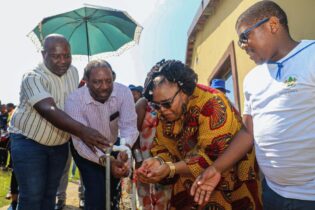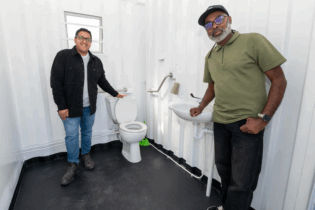Thirty two years after obtaining independence from Britain, Zimbabwe’s Local government Minister Ignatius Chombo, here has accused the former colonial masters of relegating rural communities during the pre-Independence (1980) era.
Chombo on the sidelines of a US$50 million launch for Rural Water and Sanitation Programme in Tsholotsho last Thursday told UK Aid head Dave Fish in front of journalists and Prime Minister Morgan Tsvangirai, that Britain underdeveloped rural communities just before saying that sanctions worsened the situation.
“Whatever resources came out of the pre-independence economy was ear marked for the development of the few elite whites. Not in the urban areas only, even the blacks who were occupying
fertile soils were removed and dumped in Gokwe and even here. In areas infested with Tsetse flies,” Chombo said.
He added: “The development which was meant for blacks I have known none. I have been a Local Government Minister for more than 10 years, any developments, water, sanitation, schools; clinics only came to the people after independence. Those gains which we had after independence were reversed in 2000 when we had the land reform and the problems we had with our former colonial masters ending up in sanctions. All households had clean water, borehole, protected wells, and roads. There is nothing the former colonisers helped us with if you know one program during the colonial era tell me.”
UK Aid head in Zimbabwe Dave Fish had no kind response for Chombo .
“I suspect that Minister Chombo and I disagree on certain issue which happened during and after independence, and I am not here to apologise for certain historical issues raised here, but I think it’s important that this country looks forward, and does not blame current problems to history and look back. It is really encouraging to see Ministers from all parties to the inclusive government together here at this event. The international community, Britain included, wants to work with you and you should look forward rather than looking backwards, “he responded angrily.
UNICEF is going to be in charge of the WASH programme which is going to benefit 2.5 million people from the country’s semi arid provinces. Matebeleland North and South, Masvingo, Midlands and Mashonaland West are the five provinces which are going to benefit.
According to UNICEF results of the launch are going to be seen in the next 30 days as the development partners having already identified companies to drill and maintain bores in the area.
“Bringing safe water near homes will reduce time spent in collecting water and provides opportunities for poor families to engage in small-scale productive activities.It also reduces burdens which mount on women and girls in rural areas who are the main collectors of water,” UNICEF Country representative Dr Peter Salama said.
Blair toilets for most of the rural communities in the chosen provinces are also going to be constructed.
Source: ZimEye.
org






